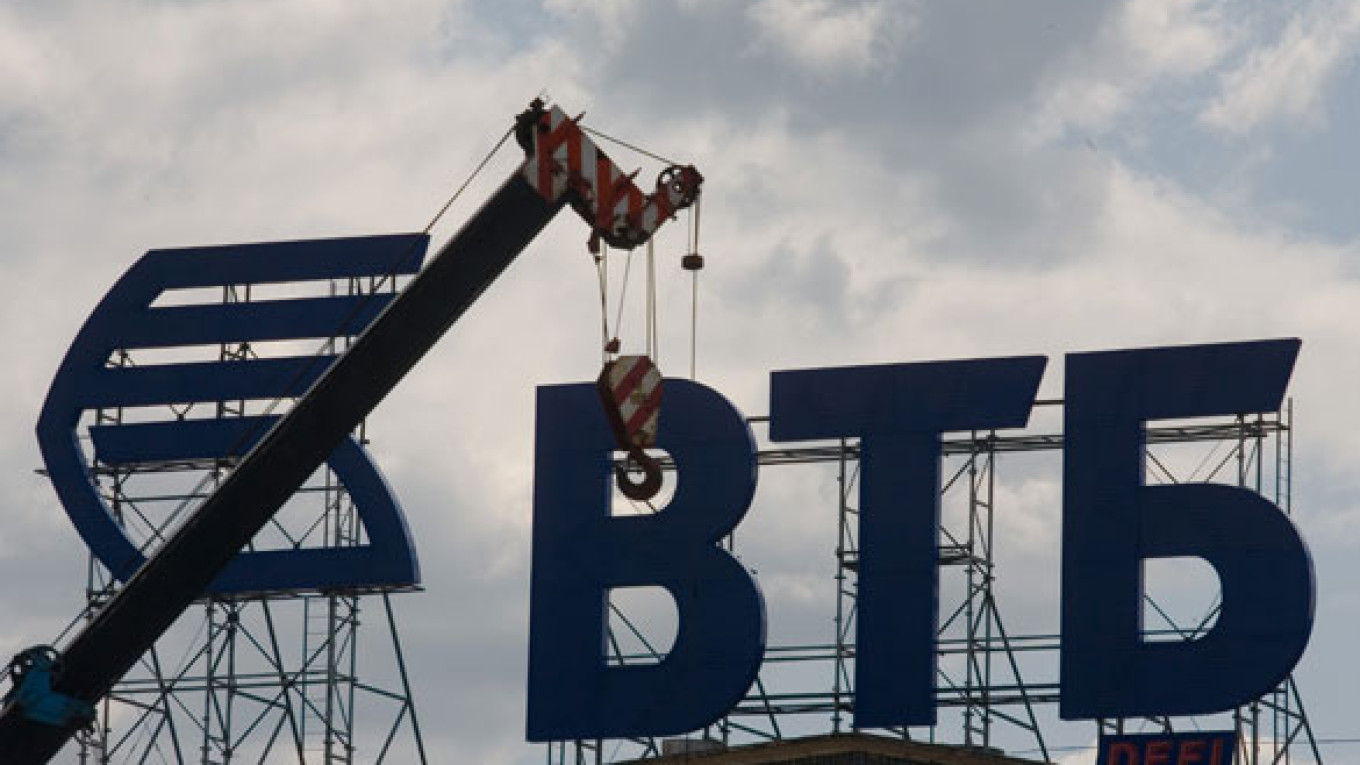The government may sell more than 35 percent of VTB to bring its stake in the bank to just over 50 percent, Finance Minister Alexei Kudrin said in comments released Monday, a move that may force the lender toward greater transparency.
"I think it makes sense to privatize a stake of any size, in this case, up to a controlling stake," Kudrin told reporters over the weekend. "The bigger the stake, the more liquid it will become."
A source close to VTB said earlier this year that the bank wanted the government to sell a stake that would be more than 10 percent, Interfax reported.
|
Company
| Current state stake, % | |
| Transneft | 78.10 | |
| Sberbank | 60.30 | |
| VTB | 85.50 | |
| Rosneft | 75.16 | |
| Rosselkhozbank | 100.00 | |
| Federal Grid Co. | 79.11 | |
| RusHydro | 60.38 | |
| Sovkomflot | 100.00 | |
| Rosagrolizing | 99.99 | |
| Rosspirtprom | 100.00 | |
| United Grain Company | 100.00 | |
Sources: Finance Ministry, company data
The state now owns 85.5 percent of VTB, the country’s second-largest bank. As the financial system struggled last year, the government injected 180 billion rubles ($5.84 billion) into the company by buying up an additional share issue and increasing its stake from 77.5 percent.
But now, the government is looking to unwind the bailout and more.
Western or Middle Eastern investment funds may snap up a stake in VTB, said Ruslan Yunusov, an analyst at Rye, Man & Gor Securities. That would improve the bank’s reputation by forcing it to show more transparency in dealing with investors, he said.
“The market will support any steps toward greater transparency,” Yunusov said. “I don’t think a local investor will be supportive of the bank’s reputation.”
VTB may gain some clout on markets outside Russia, depending on the potential buyer, he said.
The lender, which returned to profitability in the first quarter after a $2 billion loss last year, said in May that it would seek to double its share price to 15 kopeks over the next three years.
The shares closed at 7.98 kopeks on Monday, up 0.4 percent on the day, roughly in line with the broader MICEX Index. That's up from a low of 2 kopeks in February 2009, and 4.8 kopeks when the state bought up the additional share issue in September 2009.
At Monday's close, VTB's market capitalization was $27.2 billion, meaning that a 35 percent stake could bring the state $9.5 billion.
With a budget deficit slated to hit 5.4 percent of gross domestic product this year, the government is looking toward its massive asset portfolio to help bridge the gap. Economic Development Minister Elvira Nabiullina has also cast the sales as an important step toward reducing the state's "excessive" role in the economy. ?
In July, the Finance Ministry said Prime Minister Vladimir Putin had approved a plan to sell off $29 billion worth of stakes in 11 high-profile firms, including Sberbank, Transneft, Rosneft and VTB.
Kudrin said, however, that the asset sales — the largest since the controversial loans-for-shares privatizations in the mid-1990s — were unlikely to begin this year.
"Fundamentally, this is a program for covering the budget for the next three years — that is why it is here. Most likely, we will not privatize stakes in big companies this year," Kudrin said. He added that the outlines of the privatization plan will be completed in September, while the details would only be ready by the start of next year. ?
The share sales will line government coffers with 290 billion rubles ($9 billion) in 2011, 276.1 billion rubles in 2012 and 309.4 billion rubles in 2013, Finance Ministry officials said in July.
In addition to the list of the 11 large companies' stakes that are going up for sale starting next year, the Economic Development Ministry developed a similar list of smaller firms in which the government hopes to reduce its role.
Earlier this year, the ministry said it expected to raise more than $3.4 billion by selling assets this year, including 13 percent of insurer Rosgosstrakh, 25 percent of utility TGK-5 and 25 percent minus one share in shipping giant Sovkomflot.
The Federal Property Management Agency said in a statement Monday that it aimed to raise at least $283 million from a sale of 13.1 percent of Rosgosstrakh in a bidding that will last from Monday to Sept. 23.
The government isn’t selling stakes in the 11 large companies immediately because it has decided in favor of domestic borrowing to cover the deficit, said Dmitry Polevoi, an economist at ING Bank’s Moscow office.
A decline in the anticipated price of oil over the next three years may speed up the sales, he said.
On the contrary, if the oil price is higher than expected, there will be fewer motives to put the assets on the block, Polevoi said.
A Message from The Moscow Times:
Dear readers,
We are facing unprecedented challenges. Russia's Prosecutor General's Office has designated The Moscow Times as an "undesirable" organization, criminalizing our work and putting our staff at risk of prosecution. This follows our earlier unjust labeling as a "foreign agent."
These actions are direct attempts to silence independent journalism in Russia. The authorities claim our work "discredits the decisions of the Russian leadership." We see things differently: we strive to provide accurate, unbiased reporting on Russia.
We, the journalists of The Moscow Times, refuse to be silenced. But to continue our work, we need your help.
Your support, no matter how small, makes a world of difference. If you can, please support us monthly starting from just $2. It's quick to set up, and every contribution makes a significant impact.
By supporting The Moscow Times, you're defending open, independent journalism in the face of repression. Thank you for standing with us.
Remind me later.


